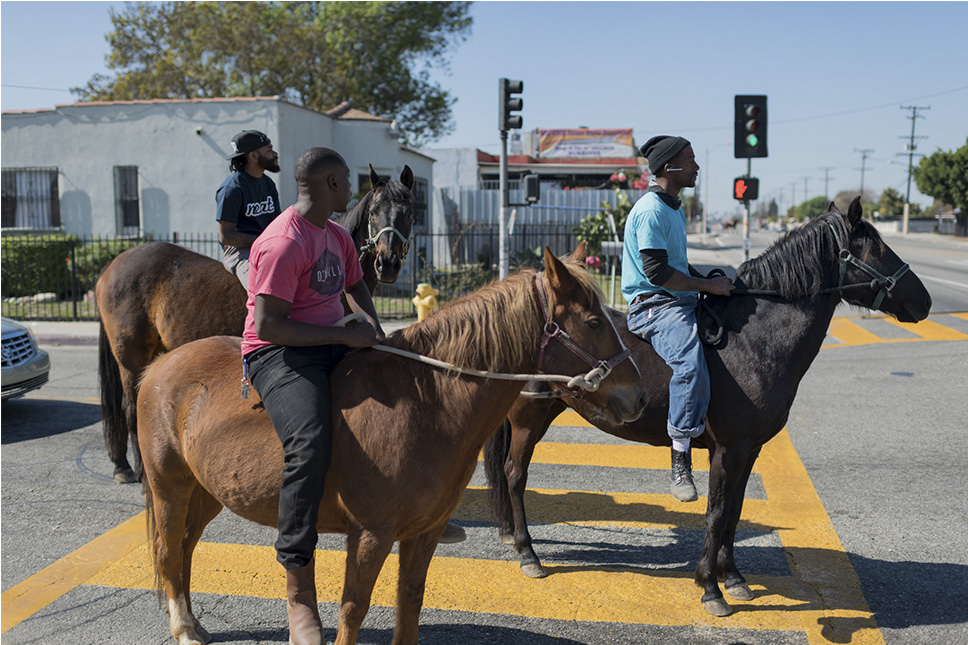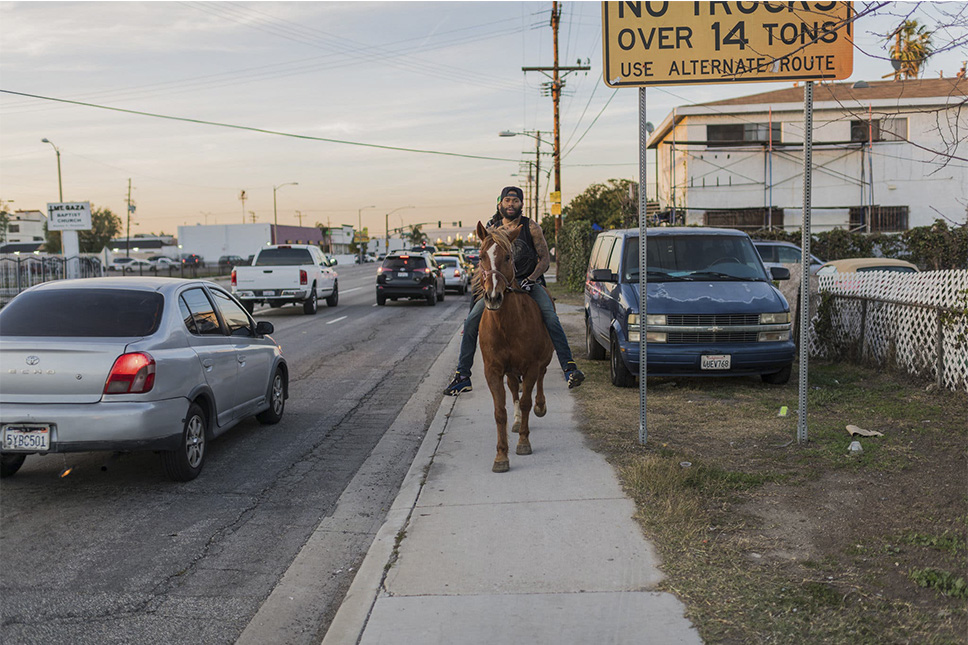
The Black Compton Cowboys: A Story of Racism, Violence and Love for Horses
Journalist Walter Thompson-Hernandez spent a year with the Compton Cowboys, who ride the streets of one of the most violent cities in Los Angeles County.
To think of the Old West is to imagine John Wayne leaning over a saloon bar or the mythical Marlboro cowboy, classic symbols of the "real" America. But in the Los Angeles county's city of Compton, black and mixed-race cowboys have been galloping through the rural Richlands Farms for two decades now. It's where the famous Compton Cowboys have rewritten the cultural legacy of the country, shackled racial and cultural stereotypes, and imposed peace as true sheriffs among the younger generation to save them from gangs.
The past and present of these ranchers cannot be separated from the violent history of a city that was hit by the crack epidemic in the 80s and 90s. The battles between gangs and the shameful way the police tried to shut them down add to that history. But they're also identified with the street rhapsodies, the " gangsta rap " movement that since the mid-80s, and through groups like N.W.A., told the world the way people lived and died in Compton.
Journalist and photographer Walter Thompson-Hernández remembered the first time he saw black cowboys trotting in the streets of the city. He was 6 and accompanying his mother to Compton Swap Meet, not far from their home in Huntington Park. "As I watched them ride off into the sunset," he wrote, "I recognized something inherent in the Westerns' cowboys and hip hop songs: these Black men were nonconformist, independent and strong."
Years later, as a veteran NYT reporter, the image was still ingrained in his memory--the obsession with drawing that other invisible face of America that has so much to do with his background and the way he was taught in school what makes someone a real American.
The motto of the Compton Cowboys is: "Street raised us. Horses saved us."
"I'm half Mexican and I grew up going to Mexico every summer, so I knew that Mexicans could be cowboys. I also knew that the American cowboy culture in the West was white. [When I saw them] I was like 'Oh, shit! Can black people be cowboys? That fucked me up in a confusing and cool way," said Thompson-Hernandez.
Following in the footsteps of his namesake, Hunter S. Thompson, the Latino embarked on the adventure of the Old West and lived with the heirs of the Compton Cowboys for over a year, chronicling an incredible story of belonging, community and love for horses in The New Generation of Cowboys in America's Urban Heartland (HarperCollins, 2020).

In the book, Thompson-Hernandez portrays ten riders with whom he lived for more than a year. However, of all of them, the real protagonist is a woman, Mayisha Akbar, who decided to found a horse ranch in Richland Farms in 1988 as one of the last agricultural areas in what was once the agricultural town of Compton.
Mayisha worked as a real estate agent, but she had a dream of raising her children among horses and leading a rural life. The streets were very dangerous then, the city was leading the country in homicides and crack and shootings were piling death among the young.
She thought if her children could be raised in the wild, maybe the horses could also help the children of her neighbors in Compton, mostly African Americans and Latinos for whom the dream of migration had become a nightmare.
Thus was born the Compton Junior Posse - known today as the Compton Cowboys - whose motto says it all: "The streets made us. The horses saved us."
RELATED CONTENT
"The kids had to decide between the version of Compton that N.W.A. described and the Compton she wanted to create," Thompson-Hernández explained. "When black children started riding horses in Caldwell, it changed the neighborhood and their lives forever."

The city of Compton has changed a lot in recent years. It is no longer the hotbed of crime and unrest that was the 1970s, nor the desolate landscape of violence and crack that sang the NWA's 'gangsta rap.' Although, when the black cowboys began serving the community at their ranch, the population was mostly African American. After the black exodus, 70% of the inhabitants of the city are now Latinos and so are the kids who take part in the educational and equestrian program at Akbar's ranch and its riders.
Only those who live in Compton have seen them ride. For most citizens of the West, multiculturalism does not travel on horseback. Racial violence outside the ranch is still commonplace.
"Outside these farms, black and brown people still deal with racial violence between them," said the journalist, for whom being mestizo has made a difference in approaching the story since being black and Mexican means he has one foot in every stirrup.
"Most whites have done a great job of erasing the experiences of people of color over time," W. Thompson-Hernández.
"As people of color, we grow up many times harboring anti-black feelings. As blacks, we can also discriminate against blacks. For both of us, the root of this racism is often unfounded. It is based on false stereotypes and cycles of violence, usually in the media, that are not based on complete honesty and truth," he added.
What makes this book exceptional is not only the story it tells about how love for horses and nature overcomes racial problems and is healing on many levels, but it also sheds light on "how most whites have done a great job of erasing the experiences of people of color over time," concluded Thompson-Hernández.
As Clint Eastwood said in The Good, the Ugly and the Bad: "The world is divided into two parts, my friend, those who have the rope around their neck and those who cut it. And this L.A. writer who was a mixed-race city cowboy for a year and a half is, like his fellow riders, one who cut the rope.











LEAVE A COMMENT: